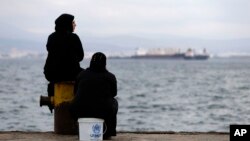The U.N. refugee agency has expressed concern that the agreement between the European Union and Turkey to curb the flow of Syrian and other refugees into Europe could unravel.
The EU-Turkey deal looks increasingly shaky as Turkish authorities warn they will pull out unless the European Union keeps its pledge to ease visa restrictions on Turkey.
U.N. refugee agency spokesman William Spindler said the UNHCR is following the situation closely. He told VOA the agency cannot afford to be complacent and has to be prepared for any contingencies.
“Although we had some concerns about this deal at the beginning, we do not see any other alternative," he said. "There is no plan B. So, we are very worried that if this situation changes, we might see again ... widespread suffering by people, deaths at sea and so on. So, we do not want to see that repeated.”
Spindler accuses the EU of not living up to its commitments. Last September, he notes, the EU agreed to relocate 160,000 refugees in Greece and Italy among 24 member countries. To date, he said, fewer than 4,000 asylum seekers have been relocated.
“There is the impression in Europe that this crisis is over because we do not see the images, the horrible images that we saw last year," he said. "... The situation has obviously improved dramatically from last year, but we still need to deal with it.”
Last year, more than 1 million refugees and migrants crossed the Mediterranean Sea into Europe. Slightly more than one-quarter of that number has arrived so far this year.
The U.N. Children’s Fund reports a sudden increase in the number of arrivals in Greece. UNICEF spokeswoman Sarah Crowe said hundreds more refugees and migrant children are becoming stranded in Greece, adding to the nearly 27,500 already there.
“The most effective tool at a time like this for children who are in limbo, stranded, exposed to risks is really a sense of stability — getting children into the routine of class work, into the routine of learning and into the routine of activities,” she said.
Crowe said UNICEF is supporting learning and recreational activities for refugee children in a camp near the Greek capital, Athens. She said education programs also are being scaled up in other camps.




